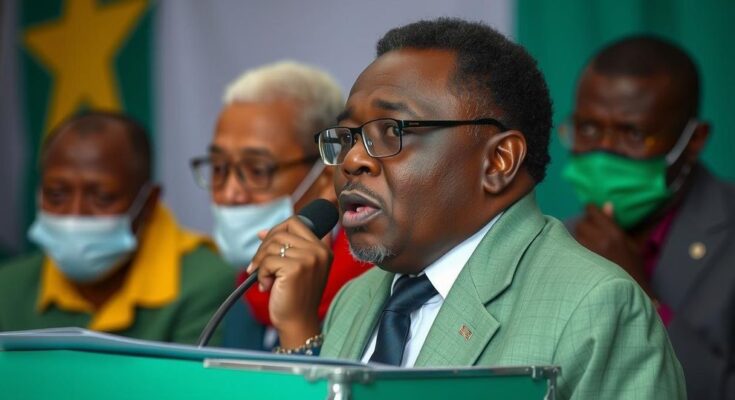In Comoros, opposition leader Daoud Abdallah Mohamed rejected the legislative election results, citing “gross fraud” amid widespread boycotts. The ruling CRC party was declared the winner, with allegations of ballot stuffing and discrepancies in voter turnout. President Azali Assoumani dismissed the claims, while the United Opposition announced it would not participate in the upcoming second round of elections.
On Monday, a prominent opposition leader in Comoros rejected the results of the recent legislative elections, which faced a significant boycott from opposition parties. Daoud Abdallah Mohamed, the former interior minister and leader of the United Opposition coalition, accused the electoral process of being plagued by “gross fraud,” including ballot box stuffing and discrepancies where certain polling stations reported more votes than the number of registered voters. The elections were held to appoint 33 lawmakers, yet the atmosphere of distrust led most opposition members to abstain from participating in the polls on Sunday.
The independent electoral commission announced that 12 candidates from the ruling Convention for the Renewal of the Comoros (CRC) party emerged victorious, claiming that the ruling party garnered between 60 and 100 percent of the votes with a reported voter turnout of 70 percent. Observers noted an irregularity during the elections in Anjouan, where voter participation appeared low, yet the ballot boxes were filled unusually quickly. The minister responsible for elections, Fakridine Mahamoud, did not provide any comments regarding the allegations.
Adding to the controversy, the opposition’s only competitor in four of the five constituencies on Moheli withdrew midday, leaving no choice but the ruling party’s candidate. President Azali Assoumani, who has been in power since 2016, dismissed the accusations of fraudulent practices as previously unfounded claims from the opposition. He further challenged the opposition to substantiate their allegations. A second round of voting is scheduled to take place on February 16, although Mohamed has stated that the United Opposition will not take part in this round.
The political landscape in Comoros has been characterized by instability and allegations of electoral malpractice, especially surrounding recent elections. The United Opposition coalition has frequently denounced the ruling party’s practices, leading to boycotts and claims of fraud during elections. President Azali Assoumani’s administration, facing scrutiny since his ascension to power in 2016, has witnessed ongoing tensions between the government and opposition factions, often stemming from issues of transparency and fairness within the electoral process.
In summary, the rejection of the election results by the Comoros opposition underscores the deepening political crisis in the nation. Allegations of electoral fraud and lack of transparency have marred the credibility of the legislative elections, eroding trust in the ruling government. With a second-round vote approaching and the opposition refusing to partake, the political future remains uncertain. This situation highlights the critical need for electoral reforms to restore confidence in the democratic process.
Original Source: www.barrons.com




